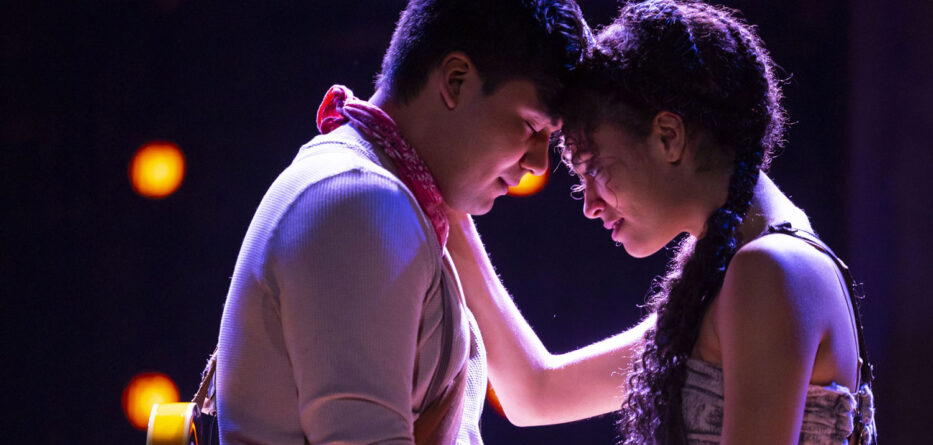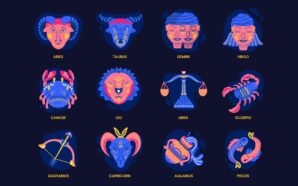Arturo Hilario
El Observador
Hadestown, the hit Broadway musical that is based on the Greek myth of Orpheus and Eurydice is coming to San Jose’s Center for the Performing Arts from September 26–October 1, 2023.
The musical updates the ancient Greek myth which follows two love stories, one of the young lovers Orpheus and Eurydice and that of King Hades and his wife Persephone, in the background of a hellish industrial South.
The music, a New Orleans inspired mix of Jazz, Blues and American Folk transports audiences to the heat of the South while telling an ancient story that continues to be relevant in the modern age.
The show and it’s music was all written by accomplished singer-songwriter and Tony Award winner Anaïs Mitchell, who originally wrote the play in 2007 as a small community production in Vermont. Now, even after winning 8 Tony Awards and a Grammy, the show continues to generate popularity and praise.
Recently Latino lead actor and Dreamer J. Antonio Rodriguez talked to us about the importance he sees in being a Latino Dreamer in the performing arts, why the story of Hadestown transcends time, and how the role of Orpheus can transform and tell a different life story depending on who is performing,
I was wondering if you could talk about your own path to the stage and performing arts. What was your inspiration to get into it, and how did that come about?
Absolutely, when I was in the first grade, we were just singing in regular little choir class, and the choir teacher, she saw something in me, and she asked if I wanted to go be in the community production of A Christmas Carol as Tiny Tim. And so, I was like, “yeah, sure, why not?” I didn’t know any better.
And so I did it, and it was, like, fun, but it really didn’t fuel anything in me because I was just so young, I didn’t understand. And it wasn’t until a couple of years later that my mom saw that there were auditions for other musicals happening at a different theater in Ardmore, Oklahoma, a little community. And then she said that if I didn’t go, she would take away my Nintendo, and so that was very important to me so I went to those auditions.
From then on, I guess it would be like from age ten till now, I really just fell in love with performing arts. And when it was time to start auditioning for colleges and decide what I really wanted to do with my life, my parents were very supportive, and my parents are first generation immigrants, and so to me, that was very special to see that their dream of me really doing what I wanted to do here in the US was being realized, and it continues to be realized. And so I’m very grateful and very blessed to be able to do this.
In April you took over the mantle of the Orpheus role. Could you talk about what that feeling was like to step into that role?
It was so incredibly special, and I felt so supported by my castmates and by all the team here, and the creative team and the stage managers and the company managers. Honestly, that’s what felt the most rewarding, I think, was I’ve built these relationships with everyone since February of 2022, and so I had built relationships with everyone for over a year. And then when I did take over as Orpheus, it was really great to feel it on stage and in the audience and everything.
But to feel the support from my own cast members and company members was even more special because we’ve all been on this journey and for them to support me and love me unconditionally, it was beautiful. It was unlike anything else.
And as a performer, what does the difference there entail in terms of mental preparedness and the work that you have to put in? Does that shift to something else, like responsibility wise or what is it like to move from one role to the other?
I would say it’s different in that I take care of myself differently. As Orpheus now, I have to be very mindful of what I do throughout the day and what I do even after the show. Right now, I usually just stay at home and play video games. I am travelling with my partner, Cecilia. She’s the dance captain of the show, and we have a little dog, and so it’s much easier for me to stay at home and just chill and play video games because I have her and I have Loki and the PS5.
So it’s really just about taking care of myself and then making sure that I show up to work, I warm up, and that I give 100% of what I have that day. And so when I was a swing, it wasn’t that I wouldn’t give 100%, I would always give 100%. That was more of I always had to be ready, and so I took care of myself in different ways. I could still go out and do more stuff, explore more of the cities, but I know myself very well. I don’t drink alcohol because I know that a sip will make me go a little hoarse.
And so anytime I’m in a show, I nix that out immediately. I was just very mindful of the swing, especially because you could find out the day, the morning if you’re going to be on that night, or you could find out in the middle of the show that you needed to go on and go out there.
It’s nice to hear that you, your partner and your dog, Loki, are together on the tour. Did you meet your partner on this show?
We met in Atlanta in 2021 before we had joined this tour, we met doing Mamma Mia. We were Sophie and Sky in Atlanta, and then we moved together to New York, and then I booked Hadestown about three months after that. And I was kind of sad because then it was like, “oh, we were together for so short, and now we have to do long distance.”
But then five months after I joined, she also booked the job, which is, I feel is something super rare to happen. And so now we’ve been traveling for over a year together, and it’s been really wonderful. We got a little dog on tour in January, he’s a little Bichon Frisé, a little white dog. I have my built-in best friends.
Can you introduce the story of Hadestown?
Absolutely. Hadestown is the modern retelling of the Greek story of Orpheus and Eurydice. It shows their parallels as young lovers, they’re paralleled with Hades and Persephone. And so Orpheus and Eurydice represent the young love, the new love, fresh. Everything is new, everything is bright, everything is wonderful. Hades and Persephone represent the older love and what can happen if you don’t tend as time goes on.
So theirs is a little more comfortable, but distant [love]. And so it’s really interesting because the original Greek telling is not very long at all, and so Anaïs Mitchell, the writer of the show, was able to create this two and a half hour long, I would say, masterpiece of theater to really give them individual characteristics. And I just think it’s so wonderful. The music is New Orleans and folk inspired, and it’s completely sung through. And so I think audiences are really going to gel with this one.
Why do you think it’s possible to have a modern telling of this Greek myth and it resonate with audiences still?
I think it’s great because all of those Greek stories, I think what’s so great about those specifically, is that you really can tell them in any context.
Think of just how many retellings of other Greek stories have been told and the themes in modern media. And so I think Hadestown is just one of them. And I think it translates so well because all those themes are universal. They’re timeless, like the theme of love, the theme of renewal, of what you would do to save the people that you love.
And that’s really Orpheus’s story. I think he is a dreamer, he is innocent, and he never in a million years would have thought that he would be on this adventure to go save the person that he loves from the underworld. And so, I think that those older stories can be modernized pretty seamlessly.
What is your favorite aspect of working on the show? Whether it’s like a favorite scene or part of the show?
For me, it’s the connection with the audience, I think. Well, there’s two parts. I think the first is the connection to the audience. I love that this show encourages the audience members to be vocal and to really react to what they’re seeing and what’s happening. And so the show for me can really change. And my show makes a big difference when the audience is just like, very clearly into it.
And so that’s my favorite part. And then my other favorite part is that we have so many wonderful covers and understudies, and these characters are made so that anyone can bring their own flavor into it, truly, that people usually think of fitting a mold perfectly to a character. So I think that anytime any of the understudies or the swings go on as one of the principles, I love it so much because I just get to see something completely fresh and completely different than what we usually see, and it’s just as amazing and just as powerful.
And I wanted to touch on the casting. You are the first Latino Orpheus for Hadestown, is that correct?
Yes, to my knowledge. I’ve been saying it, no one’s corrected me, so I’m just going to keep saying it. I’m definitely the first full time Latino Orpheus!
Can you touch on what that means to you and going back to when you talked about your inspirations and your parents and how they’re immigrants and what that means to you taking on this mantle and being part of diverse generations on stage and Broadway?
I mean, everything. Just yesterday, I had some people that messaged me on Instagram during the show, and they were like, “hi, we’re so and so, and we’re also Dreamers.” And they just speak of what it means to them to see someone like them up on stage leading the show. And to me, that just makes everything worth it, and that makes everything just so that much better. In these past five, six months since taking over as Orpheus feel really special.
And I feel kind of a responsibility to always be doing my best to keep showing that Latino, darker skinned people can be in these positions of principal roles and be in these leadership positions. And so I feel this responsibility to always be on my game so that I can make those people in the crowd proud and never give a reason for anyone to not continue giving me these opportunities. And so it’s kind of a weird mix of feeling pressure, but also being really grateful for feeling that pressure, because I get to be in this position. It’s very weird. Growing up, I didn’t see a lot of people that look like me leading shows, and I still really don’t, and so I feel really responsible.
I know there’s always talk about how people can just want to be like, “oh, there’s some diversity in for diversity’s sake.” And I really don’t think that’s true. I really think that it’s just important to have so many different kinds of stories be told because in the role of Orpheus, so many things can change the meaning just by changing who’s doing it.
My predecessor, Chibueze Ihuoma, is a Nigerian actor, and so when you’d watch his show, it would have different meanings than from when I would tell the story, because it’s just so important to see so many different ways, especially traveling the country. We hit a lot of the Midwest, we hit a lot of the South, and it’s important. It really is. I’m from Oklahoma and I really didn’t see people that look like me all the time. And so it’s an important job, and I hope that it just continues to be better, especially in the theater community.
Overall, I was wondering what your experience has been so far, and have you had a chance to reflect on it?
I think the true reflection is going to be when I’m done with my journey on the show because I’m still right in the middle of it. And so I think that right now, the adrenaline is still pumping and I’m still kind of in the tour bubble. But so far from what I’ve learned is basically just all the things that I’ve said about my role as Latino Dreamer in this show and kind of being one of the principals in it, and then just learning how to be happy when I don’t have a stable home is a really important one, because on the road all the time, things are ever changing, and that can be really frustrating.
And so I just have to really learn to always remember to it’s okay to complain a little bit, but it’s more important to remember that I have to remain grateful and have to remain with a feeling of just happiness.
Is there anything that you would like to add?
I just would tell the audience to come and be ready and be vocal and to just have their hearts and minds open.






